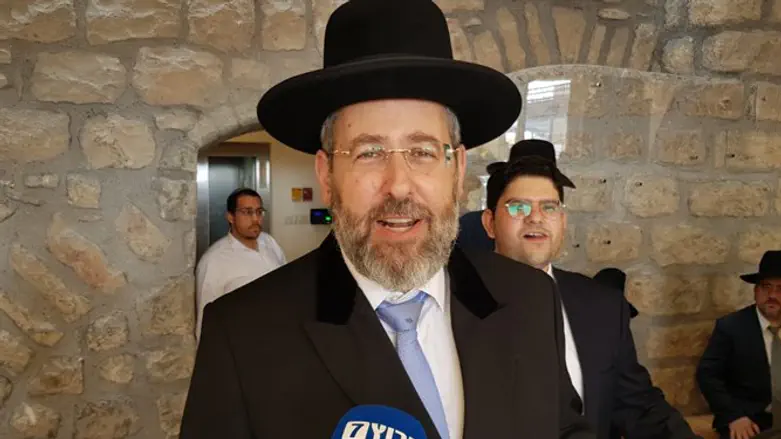
Ashkenazic Chief Rabbi David Lau on Tuesday morning spoke with Kan Moreshet about the Health Ministry's new coronavirus restrictions, which limit the number of worshipers at synagogues to 19.
Rabbi Lau said that he expects the restrictions to be set according to the size of the synagogue, but he understands that such an expectation is not possible to implement.
"The Great Synagogue in Jerusalem, even if there are 300 worshipers in the enormous hall with 3,000 seats, certainly the distances and the gaps will be large," he said. "When you open the windows, the site is ventilated. Certainly, it was possible to do this, and it would have been very correct to do this."
"The question is practically, if this stands the test of reality and works on the ground. It's impossible to examine every place, to see whether the spaces are like this or that. So there's no option right now, [other than] to do what we did."
Rabbi Lau also said that the quorum he prayed with on Tuesday morning had 19 people, and when the 20th arrived, he was sent to pray in the women's section, on a different floor.
"You could have seen by the small number of people infected at synagogues, that people understood and internalized. We are aware of the problem and it would be well if other places where people congregate would be managed in a responsible fashion, like the synagogues are."
Regarding the fast of the 17th of Tammuz, which falls on Thursday, Rabbi Lau said, "Anyone who feels any symptoms or has tested positive for coronavirus is prohibited from fasting on the 17th of Tammuz. He should take care of himself, drink, and of course anyone who feels symptoms should run quickly to be checked, and not wait even a single minute."
Rabbi Lau also discussed the upcoming holiday season.
"I am already very concerned, and I have begun to think and to see how we can organize. The holidays are really not far off. On Passover, we thought it was a one-time issue, but then Shavuot (the Festival of Weeks) came and showed us that this is not so," he said.
"I have prepared for myself several options - the option of holding smaller groups of prayer, the option of praying in large places. I very much hope that we won't need it, because at the end of the day there are many synagogues which survive due to the holiday period, and there are many Jews who live from the holiday periods, because the synagogue that he is familiar with, with the atmosphere and the prayer books that he is familiar with, and the cantor, it connects to the heart.
"I very much want to hope and pray that we will not end up there, but that very much depends on the seriousness with which we take the guidelines today."
Regarding the Attorney General's recent decision to allow women to take the Chief Rabbinate's tests and to demand the Chief Rabbinate recognize their tests, Rabbi Lau said, "The entire issue of the tests for the rabbinate is an issue which we need to clarify. The question is whether the tests are only tests for ordination, and if they are for ordination, then when it comes to ordination tests, we should [only] allow those who can also serve in those positions after that [to take the tests]. And the reality is that a neighborhood rabbi, a city rabbi, a chief rabbi, and a rabbinical judge, are positions which are for men."
"In any case the rabbinate is not a testing institute, it's an institute which provides a certificate and ordinates people.
"But there is an option - and at the beginning of my term I attempted to do something on this issue, but unfortunately I did not receive enough cooperation from the Education Ministry - there is an option to think about whether the rabbinate can give some kind of recognition for learning. Certainly, I am concerned that the Chief Rabbinate, whose job it is to awaken the public and to increase Judaism amongst the public - so some of these things can be allowed via tests on various issues. Then, recognition of the knowledge, that it was properly understood and in the appropriate fashion - if I knew that it would be acceptable to the Education Ministry, then there might be a chance of opening that. Unfortunately, the Education Ministry preferred, for its own reasons, to hold the tests itself, and because of this we returned to it being that the rabbinate's tests are only for ordination [purposes]. I think that is not right.
"I very much hope that the goal of all those who came and requested to be tested, while knowing that the rabbinate right now is testing and granting ordination, and not testing knowledge - I very much hope that their goal is not to break the existing framework and order, which have existed in the Jewish nation for generations."
